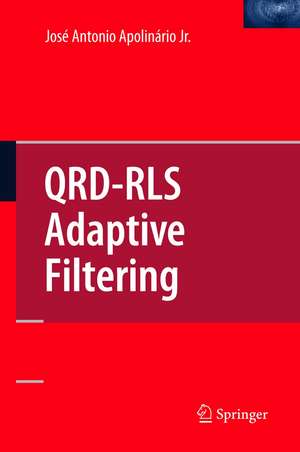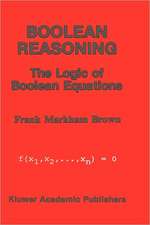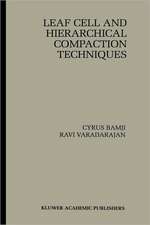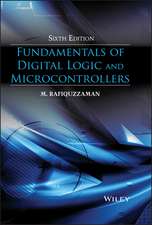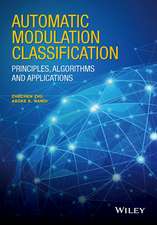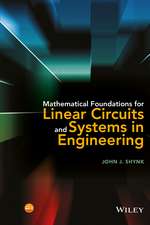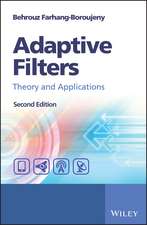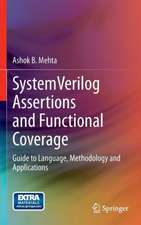QRD-RLS Adaptive Filtering
Editat de JOSE APOLINARIO JRen Limba Engleză Paperback – 28 oct 2010
| Toate formatele și edițiile | Preț | Express |
|---|---|---|
| Paperback (1) | 948.16 lei 6-8 săpt. | |
| Springer Us – 28 oct 2010 | 948.16 lei 6-8 săpt. | |
| Hardback (1) | 952.89 lei 6-8 săpt. | |
| Springer Us – 10 feb 2009 | 952.89 lei 6-8 săpt. |
Preț: 948.16 lei
Preț vechi: 1156.29 lei
-18% Nou
Puncte Express: 1422
Preț estimativ în valută:
181.45€ • 187.45$ • 151.02£
181.45€ • 187.45$ • 151.02£
Carte tipărită la comandă
Livrare economică 26 martie-09 aprilie
Preluare comenzi: 021 569.72.76
Specificații
ISBN-13: 9781441935267
ISBN-10: 1441935266
Pagini: 372
Ilustrații: XX, 356 p.
Dimensiuni: 155 x 235 x 25 mm
Greutate: 0.52 kg
Ediția:Softcover reprint of hardcover 1st ed. 2009
Editura: Springer Us
Colecția Springer
Locul publicării:New York, NY, United States
ISBN-10: 1441935266
Pagini: 372
Ilustrații: XX, 356 p.
Dimensiuni: 155 x 235 x 25 mm
Greutate: 0.52 kg
Ediția:Softcover reprint of hardcover 1st ed. 2009
Editura: Springer Us
Colecția Springer
Locul publicării:New York, NY, United States
Public țintă
ResearchDescriere
I feel very honoured to have been asked to write a brief foreword for this book on QRD-RLS Adaptive Filtering–asubjectwhichhas been close to my heart for many years. The book is well written and very timely – I look forward personally to seeing it in print. The editor is to be congratulated on assembling such a highly esteemed team of contributing authors able to span the broad range of topics and concepts which underpin this subject. In many respects, and for reasons well expounded by the authors, the LMS al- rithm has reigned supreme since its inception, as the algorithm of choice for prac- cal applications of adaptive ltering. However, as a result of the relentless advances in electronic technology, the demand for stable and ef cient RLS algorithms is growing rapidly – not just because the higher computational load is no longer such a serious barrier, but also because the technological pull has grown much stronger in the modern commercial world of 3G mobile communications, cognitive radio, high speed imagery, and so on.
Cuprins
QR Decomposition An Annotated Bibliography.- to Adaptive Filters.- Conventional and Inverse QRD-RLS Algorithms.- Fast QRD-RLS Algorithms.- QRD Least-Squares Lattice Algorithms.- Multichannel Fast QRD-RLS Algorithms.- Householder-Based RLS Algorithms.- Numerical Stability Properties.- Finite and Infinite-Precision Properties of QRD-RLS Algorithms.- On Pipelined Implementations of QRD-RLS Adaptive Filters.- Weight Extraction of Fast QRD-RLS Algorithms.- Linear Constrained QRD-Based Algorithm.
Recenzii
From the reviews:
“Starting with a review of the history and the essential concepts in (numerical) linear algebra that are essential in the development of QR decomposition, the book continues with an overview of adaptive filtering techniques, including LMS and RLS algorithms. … The chapters flow on nicely from one to the other, and the editor is to be congratulated on achieving this. The book is a useful and welcome contribution to the broad topic of numerical linear algebra.” (Andrew Dale, Zentralblatt MATH, Vol. 1170, 2009)
“Starting with a review of the history and the essential concepts in (numerical) linear algebra that are essential in the development of QR decomposition, the book continues with an overview of adaptive filtering techniques, including LMS and RLS algorithms. … The chapters flow on nicely from one to the other, and the editor is to be congratulated on achieving this. The book is a useful and welcome contribution to the broad topic of numerical linear algebra.” (Andrew Dale, Zentralblatt MATH, Vol. 1170, 2009)
Textul de pe ultima copertă
QRD-RLS Adaptive Filtering covers some of the most recent developments as well as the basic concepts for a complete understanding of the QRD-RLS-based adaptive filtering algorithms. It presents this research with a clear historical perspective which highlights the underpinning theory and common motivating factors that have shaped the subject.
The material is divided into twelve chapters, going from fundamentals to more advanced aspects. Different algorithms are derived and presented, including basic, fast, lattice, multichannel and constrained versions. Important issues, such as numerical stability, performance in finite precision environments and VLSI oriented implementations are also addressed. All algorithms are derived using Givens rotations, although one chapter deals with implementations using Householder reflections.
QRD-RLS Adaptive Filtering is a useful reference for engineers and academics in the field of adaptive filtering.
The material is divided into twelve chapters, going from fundamentals to more advanced aspects. Different algorithms are derived and presented, including basic, fast, lattice, multichannel and constrained versions. Important issues, such as numerical stability, performance in finite precision environments and VLSI oriented implementations are also addressed. All algorithms are derived using Givens rotations, although one chapter deals with implementations using Householder reflections.
QRD-RLS Adaptive Filtering is a useful reference for engineers and academics in the field of adaptive filtering.
Caracteristici
Provides a comprehensive framework of QRD-RLS adaptive filtering
Compiles the research of more than a decade into a single publication
Includes an important class of algorithms that are efficient in terms of speed of convergence, computational complexity, and numerical stability
Covers algorithms for many scenarios such as single channel, multichannel, and output filtering
Includes supplementary material: sn.pub/extras
Compiles the research of more than a decade into a single publication
Includes an important class of algorithms that are efficient in terms of speed of convergence, computational complexity, and numerical stability
Covers algorithms for many scenarios such as single channel, multichannel, and output filtering
Includes supplementary material: sn.pub/extras
